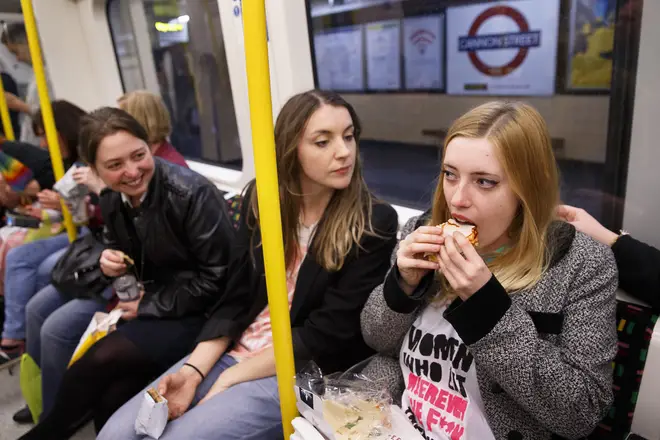
Clive Bull 1am - 4am
10 October 2019, 08:25

Eating on the UK's trains and buses should be banned to help tackle child obesity, the country's leading doctor has said.
Professor Dame Sally Davies, the outgoing Chief Medical Officer for England, said eating on public transport should be banned and the sugar tax extended, or the Government will fail to meet its target to halve childhood obesity.
Professor Davies used a major report to demand bolder action from ministers, including stricter regulation of food companies that seek to manipulate children.
She called for the successful tax on sugary drinks to be extended to milk drinks that contain added sugar, such as milkshakes, and for ministers to consider plain packaging for unhealthy food.
And she said more must be done to stop youngsters being "dazzled by companies" offering junk food, saying children are "drowning in a flood of unhealthy food and drink options".
Her report puts her at odds with Prime Minister Boris Johnson, who has made clear his concerns over "sin taxes" such as the sugar tax, and what he sees as "the continuing creep of the nanny state".
Among her series of bold recommendations, Dame Sally said the Government should:
- Prohibit eating and drinking on public transport in a bid to curb children snacking.
- Extend the sugar tax to sweetened milk-based drinks with added sugar.
- Ensure all publicly-funded sporting venues and major sporting events only advertise and sell low- calorie, low-fat and low-salt and/or sugar products.
- Tax food firms that fail to reduce sugar, fat and salt in their products quickly enough, and consider plain packaging (as for tobacco) for junk food.
- Impose a cap on the number of calories per serving at food outlets.
- Make free drinking water available in takeaways, food shops and restaurants.
- Phase out all marketing, advertising and sponsorship of less healthy food and drink products across all media, including online, at any major public venue or public-funded event, and on any public-sector-owned advertising site.
- Curb car speed limits near schools and homes to help improve air quality and encourage children to walk or cycle.
- Strengthen regulation of marketing of follow-on formula milk and improve promotion of breastfeeding, which is known to help reduce the risk of obesity.
- Introduce mandatory standards for the nutritional content of foods for children under the age of two.
In her review, Dame Sally said "excess weight has slowly crept up on us all and is now often accepted as normal".
Some 1.2 million children are now clinically obese, with some suffering Type 2 diabetes, asthma and musculoskeletal pain, as well as mental health problems, such as depression, she said.
As many as 120,000 cases of asthma in children may be caused by overweight or obesity, her report said, while as many as 650,000 children are thought to have fatty liver disease caused by being overweight.
Increasing portion sizes and the ready availability of junk food means children now, on average, consume three unhealthy snacks and sugary drinks a day, containing seven teaspoons of sugar.
Dame Sally said in her report: "The Government ambition is to halve childhood obesity by 2030 - in England, we are nowhere near achieving this.
"Yet, if we are bold, we can achieve this goal."
Turning to food firms, she said: "I want to see our children's health, not companies' profits, put at the forefront of government policy."
She said children "are constantly exposed to advertising for unhealthy food and drink".
"Companies often use children's cartoon characters and sponsorship of major sporting events to market these items, casting them as the shining star in children's minds," she said.
"Unhealthy options appear to flow freely, flooding high streets, shops and checkouts."
In 2017, more than £300 million was spent on advertising soft drinks, sweet and sweet and savoury snacks, compared with £16 million spent on advertising fruit and vegetables, the report said.
"Adverts are everywhere, from bus stops to our mobile phones. Children are explicitly targeted with sophisticated techniques."
Dame Sally said weight-loss programmes and treatment were all being undermined by environments that promote unhealthy food.
"It is like treating people for cholera and then sending them back into their homes where the water is still contaminated with cholera," she said.
She said the Government "must not shy away from regulation", adding: "When Government sets targets or legislates, business innovates and can still make a profit."
She added: "Politicians, I call on all of you across the political spectrum to come together and take action. The health of our children is in your hands."
The report, which was commissioned by Health Secretary Matt Hancock, also says 90,500 children may be eligible for weight-loss surgery yet only around 10 have it each year.
Health Secretary Matt Hancock said: "Professor Dame Sally Davies has done more than anyone to promote the health of the nation over a decade as CMO. Her parting report is no different and we will study it closely and act on the evidence."